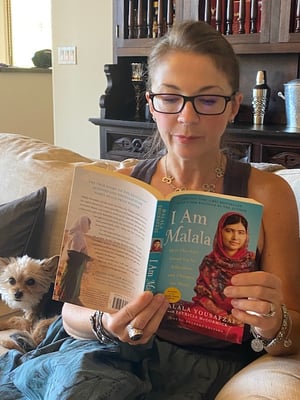I Am Malala: How One Girl Stood Up for Education and Changed the World by Malala Yousafzai with Patricia McCormick is a New York Times Bestseller. "[Yousafzai's] strong voice and ideals come across on every page, emphasizing how her surroundings and supportive family helped her become the relevant figure she is today," said the School Library Journal. The SEL themes to draw out of this book are courage, strength, handling fear, goal setting, the importance of family and influence, and perseverance and resilience.
Overview
This is a biography of a young girl named Malala, living in the city of Mingora in the Swat Valley in northeast Pakistan. Her father ran several schools, one of which Malala attended and where she excelled as a student. Malala describes her closeness with her family and their influence on her thoughts on education—specifically on the importance of education for girls and women.
By the time Malala was 10 years old, the Taliban had taken over the region where she lived. Her parents, in particular, her father, were powerful influences over her and taught her to stand up for what she believed in, and she began speaking out about the importance of education. She fought for her right to go to school, enduring difficult conditions and continuing to go to class when other young girls were bowing to the pressure of their male family members forbidding them to attend.
Because of her outspokenness, she became a target for the Taliban, and one day, her bus was stopped on her way home from school. Gunmen boarded the bus, demanded to know who Malala was, and shot her at point-blank range. She was transported to a hospital in Birmingham, England, where she was treated for her wounds, fought through rehabilitation, and continued to speak out for the right of girls to receive an education. She eventually received the Nobel Peace Price in 2014 when she was only 17 years old! I Am Malala is a powerful example of what can be accomplished with belief and conviction. I urge you to read this book with your class because it's about a student fighting for education who is the same age as the students you have in your class.
Socratic Seminar Questions
"I am Malala, a girl like any other - although I do have my special talents." p11.
- What special talents do you have? Do you think Malala is special? Why do you think she doesn't think of herself as special?
"I say that if you check a boy's backpack, it will always be a mess, and if you check his uniform, it will be dirty. This is not my opinion. This is just a fact." p 12
- Malala seems to have a stereotype of boys. Do you agree with her? Why or why not?
- She says that it's a fact, not an opinion. Is she right about that?
"But boys are, well, boys. Most of them are not as civilized as girls." p 13
- Again, Malala's opinion of boys seems to be a stereotype. What is this stereotype? Is it fair?
Malala tells us about her friend Safina. She tells us that she thinks Safina took her pink plastic cell phone and claimed it was hers.
- How did Malala handle this situation? Do you agree with how she dealt with it? What would you have advised her to do?
- What was his response when Malala's father finds out that she had stolen some trinkets from her friend? Do you think that was a good way to parent her in this situation? What would you have done if you had been her father?
Malala apologizes to Safina and is disappointed when Safina doesn't return the apology but they end up moving past the incident and can continue being friends.
- Have you ever had a disagreement with your friend? How did you resolve the issue? Were you able to remain friends? Why or why not?
Malala describes some of the expectations for women and what they must wear in her community. She explains that these obligations come from their religion.
- How does Malala feel about that? What does she say that gives you this impression?
- Can you think of some expectations of women in your community that are different from those of men in your community? What do you think about these differences? Are they fair? Where do you think they come from?
Emozi Lesson Connections
Grade 6
- Unit 1, Lessons 2, 3, 5, 11,12
- Unit 2, Lessons 1, 4, 10
- Unit 3, Lessons 1,3,6, 9,10,12
- Unit 1, Lessons 3, 4, 7, 12
- Unit 2, Lessons 3, 5, 7, 11
- Unit 3, Lessons 1, 2, 7, 9, 12
Grade 8
- Unit 1, Lessons 2, 5, 8, 9, 10, 11
- Unit 2, Lessons 1, 9, 11, 12
- Unit 3, Lessons 4, 7, 9, 11



